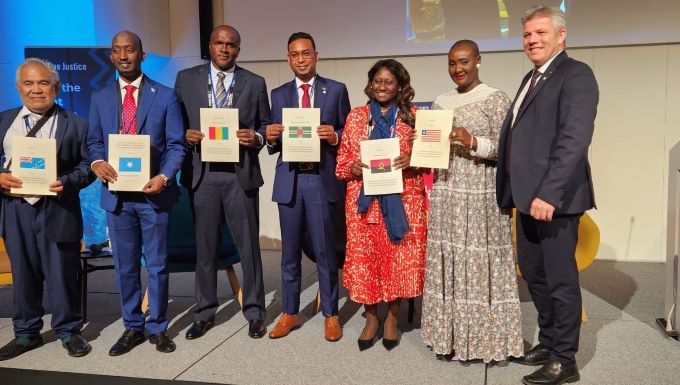At Blue Justice Conference 2023 In Denmark
Liberia on Thursday 23rd March 2023 joined sixty (60) countries from across the world including Benin, Chile, Costa Rica, Faroe Islands, Fiji, Ghana, Greenland, Honduras, Iceland, and Indonesia to sign the Copenhagen Declaration, which is a legally non-binding agreement about global fisheries crime.
Other countries that signed the declaration include Kiribati, Maldives, Marshall Islands, Mexico, Mozambique, Myanmar, Namibia, Nauru, Nicaragua, Norway, Palau, Panama, Philippines, São Tomè and Principe, Scotland, Seychelles, Solomon Islands, South Africa, Sri Lanka, Timor Leste and Uruguay, said a press release from NaFAA.
The Director General of the National fisheries and Aquaculture Authority, (NaFAA) Hon. Emma Metieh Glassco signed on behalf of the government and people of the Republic of Liberia in UN City, Copenhagen, Denmark.
The Fisheries Ministers and Directors of the 61 nations recognized that their countries are dependent on the sea and its resources and the opportunities it holds for the economy, food security and well-being of our population are determined to support a healthy and thriving fishing industry that is based on fair competition and the sustainable use of the ocean.
They at the same time committed to work towards the fulfillment of the United Nations Sustainable Development Goals (UN SDGs) particularly in relation to Goal 14 on “Life Below Water”, Goal 1, “End to Poverty” and Goal 16 on “Peace, Justice and Strong Institutions.”
The high level fisheries experts from Fisheries Nations are also convinced that there is a need for the global community to recognize the existence of transnational organized crime in the global fishing industry and that this activity has a serious effect on the economy, distorts markets, harms the environment and undermines human rights.

At the same time, they also recognized that this transnational activity includes crimes committed through the whole fisheries supply and value chains which include illegal fishing, corruption, tax and customs fraud, money laundering, embezzlement, document fraud and human trafficking.
Accordingly, they recognized further, the inter-continental flow of illegal fish products, illicit money and human trafficking victims in transnational organized crime cases in the global fishing industry and that all regions of the world need to cooperate when investigating such acts.
In the declaration, the Ministers and experts acknowledged inter-agency cooperation between relevant governmental agencies is essential at a national, regional, and international level to prevent, combat and eradicate transnational organized crime in the global fishing industry.
Meanwhile, the fisheries experts recognized the vulnerability of developing nations, small island developing states and other Large Ocean Nations on the impact of transnational organized crime.
They emphasized the continuous support on the highest level and the necessity for awareness raising on these issues through events such as the International FishCrime Symposium.

